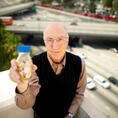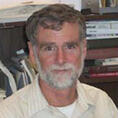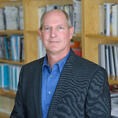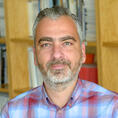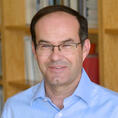CE-CERT Faculty Charles Wyman, William (Bill) Carter, Matthew Barth, Georgios Karavalakis, and Thomas Durbin have been listed amongst the top 2% of scientists in the world in Stanford University's publicly available database of top-cited scientists. This database provides standardized information on citations, h-index, co-authorship adjusted hm-index, citations to papers in different authorship positions and a composite indicator (c-score), and scientists are classified into 22 scientific fields and 176 sub-fields. The rating is based on on the top 100,000 scientists with and without self-citations or a percentile rank of 2% or above in the sub-field.
For more information on this database, visit the website here: https://elsevier.digitalcommonsdata.com/datasets/btchxktzyw/4
Congratulations to our fellow faculty! Read more below for a brief bio on each of them.
Charles Wyman
Charles Wyman's research interests include biological and thermochemical conversion of abundant, non-food cellulosic biomass to transportation fuels on biomass pretreatment, enzymatics hydrolysis, and dehydration to make appropriate precursors.
Dr. Wyman has devoted most of his career to leading advancement of technology for biological conversion of cellulosic biomass to ethanol and other products. In the fall of 2005, he joined UCR as a Professor of Chemical and Environmental Engineering and the Ford Motor Company Chair in Environmental Engineering with a research focus on pretreatment, enzymatic hydrolysis, and dehydration of cellulosic biomass to produce reactive intermediates for conversion to fuels and chemicals. Before joining UCR, he was the Paul E. and Joan H. Queneau Distinguished Professor in Environmental Engineering Design at the Thayer School of Engineering at Dartmouth College. Dr. Wyman recently founded Vertimass LLC that is devoted to commercialization of novel catalytic technology for simple one-step conversion of ethanol to fungible gasoline, diesel, and jet fuel blend stocks. Dr. Wyman is also cofounder and former Chief Development Officer and Chair of the Scientific Advisory Board for Mascoma Corporation, a startup focused on biomass conversion to ethanol and other products.
William (Bill) Carter
Bill Carter is an Emertius Research Chemist at both CE-CERT and UCR's Air Pollution Research Center. His research concerns the gas-phase atmospheric reactions of volatile organic compounds (VOCs) and the assessment of reactivities of VOCs in the atmosphere. Chemical mechanisms which he developed have been implemented in airshed models used by a number of control agencies and research groups, and VOC reactivity scales also developed by Dr. Cater are widely utilized in assessing ozone impacts of alternative fuels.
Dr. Carter received his B.A in chemistry from University of California, Riverside, attended California Institute of Technology from 1967-1969, and received his Ph.D. in physical chemistry from the University of Iowa in 1973.
Matthew Barth
Professor Barth received his B.S. degree in Electrical Engineering/Computer Science from the University of Colorado in 1984, and M.S. (1985) and Ph.D. (1990) degrees in Electrical and Computer Engineering from the University of California, Santa Barbara. Professor Barth was also a member of the technical staff in the Advanced Technologies Division of General Research Corporation, Santa Barbara from 1985 to 1986. From 1986 to 1987 he conducted research at the University of Tokyo as a visiting research student. Upon completion of his Ph.D., Professor Barth was a visiting researcher at Osaka University, Japan, conducting research in systems engineering from 1989 to 1991. Dr. Barth joined the University of California-Riverside in 1991, conducting research in Electrical Engineering and at the Center for Environmental Research and Technology (CE-CERT), where he is currently Director and the Yeager Families Chair. Professor Barth’s research focuses on applying engineering system concepts and automation technology to Transportation Systems, and in particular how it relates to energy and air quality issues. His current research interests include Intelligent Transportation Systems, Vehicle Activity Analysis, Transportation/ Emissions Modeling, Electric Vehicle Technology, and Advanced Sensing and Control. Professor Barth is active in the U.S. Transportation Research Board currently serving on the Transportation and Air Quality Committee and the Intelligent Transportation Systems Committee.
Georgios Karavalakis
Georgios Karavalakis joined UCR's CE-CERT in July 2020 and leads an experimental research program in combustion engines, alternative fuels, and transportation emissions. He received his Ph.D. in chemical engineering from the National Technical University of Athens. His MSc in environmental engineering from University of Portsmouth and also his BEng(Hons) in engineering from University of Portsmouth.
Dr. Karavalakis current research focuses on the environmental impacts of low-carbon and zero-carbon fuels and their interaction with emerging engine technologies. He is patricularly interested in the physicochemical characterization of emissions from ground and marine transportation, gaseous and liquid fuels, and PM health effects. He leads the research activities for the measurement of secondary aerosol formation from combustion engines.
Thomas Durbin
Tom Durbin is conducting research in the area of vehicle emissions with an emphasis on studying particulate emissions. This research includes programs to quantify particulate emissions from in-use gasoline and diesel vehicles, smoking vehicles, as well as alternative fuel vehicles. Dr. Durbin is also currently involved in research to evaluate the effectiveness of OBDII systems in monitoring emissions-related malfunctions and in diesel fuels research with biodiesel.
Prior to joining the vehicle emissions group, Dr. Durbin was involved in several other areas of research at CE-CERT including renewable energy and fuel sources and advanced vehicle technologies. Tom Durbin received his Ph.D. in physics from the University of California, Riverside in 1994.
